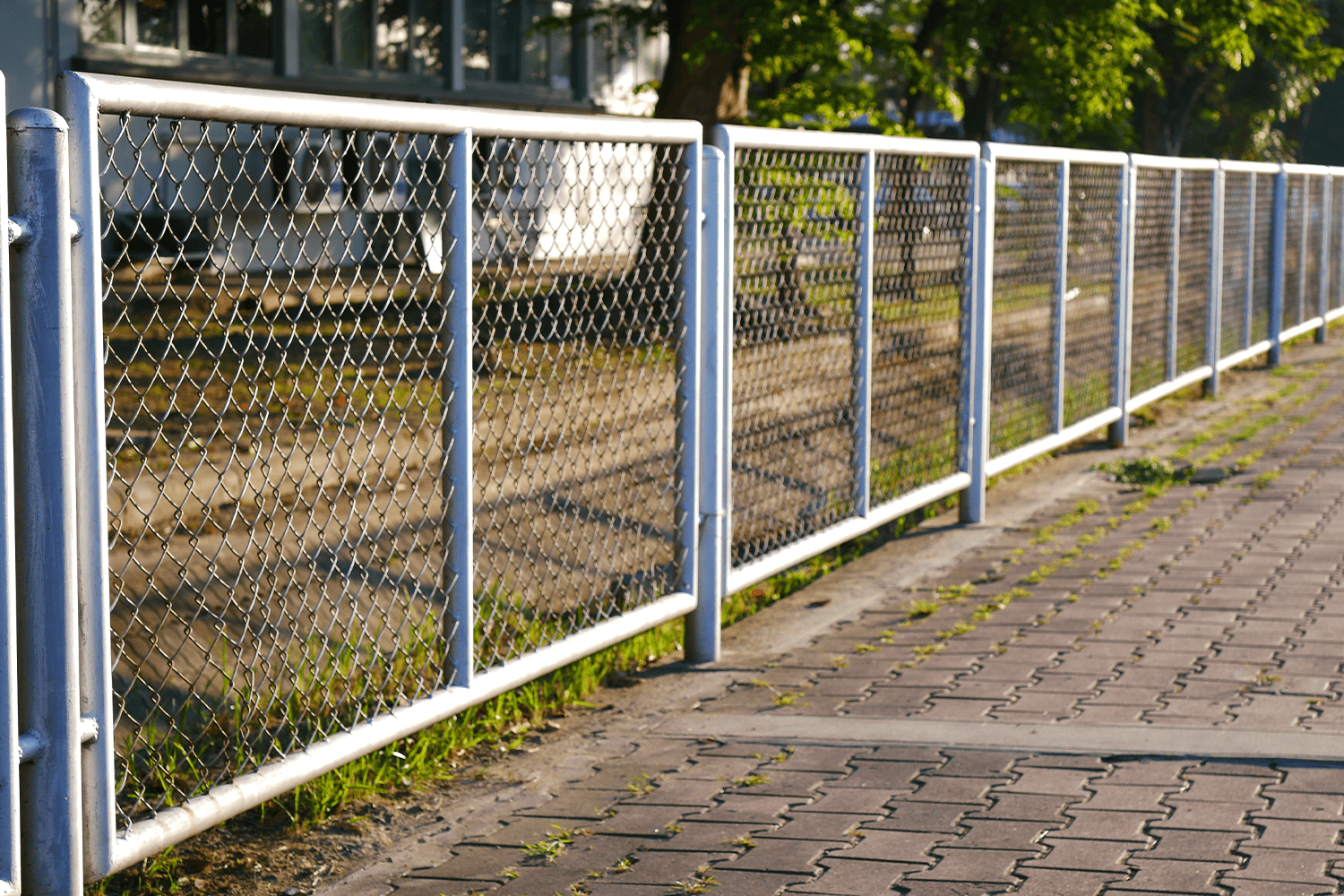If you're looking for a heavy-duty option that won't break the bank, chain link fencing could be the perfect fit.

How Much Does a Chain Link Fence Cost?

Chain link fencing combines ruggedness and visibility. It’s a secure and sturdy barrier you can still easily see through, making it a practical fencing choice for lots of spaces. The design is so simple and effective it’s gone virtually unchanged for decades.
According to Vince Christofora, owner of Woodstock Hardware, chain link fences are also “one of the most affordable fences you can install.”
On This Page
What Is a Chain Link Fence?
According to Christofora, a chain link fence features woven metal mesh usually made from galvanized wire. This mesh stretches tightly between metal posts sunk into concrete, providing a sturdy, strong foundation. Although chain link fencing is easy to see through, fabric or plastic slats can be added to cover chain link fence for added privacy.
Pros of a Chain Link Fence
Chain link fencing offers plenty of benefits in cost and construction.
- Durability: Unlike wood fences that can rot, chip or peel, chain link fences can take a beating for years and look pretty much the same. They’re also relatively impervious to extreme heat, cold or moisture.
- Affordable: Chain link fencing is considerably cheaper than wood or vinyl fencing. Experienced DIYers can can install it, reducing labor costs.
- Minimal maintenance: Metal construction provides ample protection against the elements. It doesn’t need staining, repainting or waterproofing like wood or vinyl fencing.
- Visibility: The wire mesh is strong and tight enough to keep kids and pets safely contained while letting you see what’s going on beyond it.
Cons of a Chain Link Fence
Despite its benefits, chain link fencing isn’t for everyone. Consider these potential drawbacks before you decide:
- Not great for home resale: The basic look and affordability of chain link fences don’t give the property value boost more attractive vinyl or wood fences provide.
- Not aesthetically pleasing: The industrial/commercial look lacks the rustic charm of wooden or vinyl options and may clash with your home’s design.
- Lack of privacy: Because you can easily see through chain link fences, they’re not great for those who put a premium on privacy.
- Not for residential security: The wide links and typical four-to-five-foot fence height are easy for intruders to climb.
How Much Does a Chain Link Fence Cost?
The price varies with the height of the fence, type and installation process. According to Brian Gregory at Foothill Fence, standard galvanized chain link fencing costs about $10 per linear foot. They charge $1,200 per day for labor for a two-man crew with a work truck, tools, and equipment.
Fencing installation time depends on the size of the job, so work with your installer to determine a precise number. Additional challenges like hills, brush or lawn sprinklers can increase the installation rate. Foothill Fence is based in Los Angeles, so their costs are higher than the rest of the country; pricing in your area may differ.
Don’t forget other potential expenses like building permits, or tearing down and hauling away an old fence.
Chain link vs. Wood and Vinyl Fence Cost
If you compare the costs of chain link fencing components at your local home center with those for wood or vinyl fencing, you may find that they are more similarly priced than you anticipated. It is the labor involved in installing these different fence options that is the hidden factor here.
Be aware that constructing a wood or vinyl fence will take longer, possibly up to three times longer, than a chain link fence of the same length. Consequently, wood and vinyl fences that are professionally installed are more expensive because of this additional labor involved in their installation.
Types of Chain Link Fences
Galvanized metal
This is the classic gray version you’ve probably seen at ball fields and backyards, with galvanized coating to increase its durability. This coating, usually zinc, protects the underlying steel from rust and corrosion, as well as cosmetic scratches. Galvanized metal fencing costs about $10 per linear foot.
Vinyl-coated (aka PVC-coated)
Galvanized fencing can also feature vinyl coating, adding another layer of protection and a range of color options. According to Gregory, their most popular colors are black, forest green, dark brown, beige and gray.
This could be a great choice for those who aren’t fans of the industrial look of galvanized fencing, and want it to blend into the background more. Vinyl-coated chain link fencing costs about $14 per linear foot.
Considerations When Buying a Chain Link Fence
Height: A taller fence provides more security and reduces the chances of a dog jumping over, but the extra material costs more and may be challenging to install. Most chain link fencing is four feet high, but it can be available from three to 12 feet.
Installation: Professional installers do the job done quickly and correctly. But if you want to save money and think you have the know-how, install the chain link fence yourself. Just remember: The money you save may not be worth it if the project takes longer than you thought, or if you end up with an unprofessional-looking result.
Mesh size: Depending on the supplier, you could choose the size of the mesh openings of the fence or the distance of the diamond from side to side. While 2-3/8-inch is the standard for residential use, mesh sizes as low as 3/8-inch offer more security since they’re harder for intruders to climb. Keep in mind the smaller the mesh size, the more metal required to construct it, meaning a higher material cost.
Gauge: Many chain link fences are available in different gauges; the lower the gauge, the thicker the wire. Thicker gauge fences are ideal for large dog kennels or baseball backstops. They also offer higher security, providing a sturdier barrier that’s harder to cut through.




















